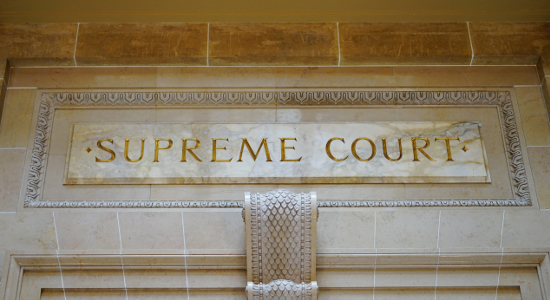
June 27, 2018 – A state Supreme Court majority (4-3) has issued an order that says Tony Evers, the superintendent of public instruction, is entitled to decline the Wisconsin Department of Justice’s representation and get his own lawyer in a pending case.
The majority also ruled that Gov. Scott Walker is not a necessary party to the case in which petitioners argue that Superintendent Evers must comply with a new state law that lets the governor review and nix administrative rules proposed by state agencies.
State Attorney General Brad Schimel had argued that state law requires the Department of Justice (DOJ) to represent state officials and agencies in lawsuits. Evers, a Democratic gubernatorial candidate, did not want DOJ representation and argued that he could choose counsel as a constitutional officer.
In Koschkee v. Evers, 2018 WI 82 (June 27, 2018), a 4-3 majority sided with Evers, concluding that “Evers and the Department of Public Instruction are entitled to counsel of their choice and are not required to be represented by the Department of Justice.”
Justice Rebecca Bradley dissented in part and concurred in part, joined by Justices Michael Gableman and Daniel Kelly. R. Bradley argued that the “Wisconsin Constitution and the applicable statutes unmistakably require the Department of Justice to represent Evers,” but agreed with the majority that Gov. Walker is not a necessary party.
DOJ Wanted to Represent Evers
When the original action was filed, DPI lawyers told DOJ that the case would not be referred to DOJ for representation. But Gov. Walker requested that DOJ represent Evers and the Department of Public Instruction (DPI). The issue was litigated.
The majority invoked the Court’s superintending and administrative authority over all courts in the state in determining that Evers is entitled to counsel of choice.
 Joe Forward, Saint Louis Univ. School of Law 2010, is a legal writer for the State Bar of Wisconsin, Madison. He can be reached by email or by phone at (608) 250-6161.
Joe Forward, Saint Louis Univ. School of Law 2010, is a legal writer for the State Bar of Wisconsin, Madison. He can be reached by email or by phone at (608) 250-6161.
“Our supervisory authority is not to be invoked lightly,” the majority noted. “However, the ‘necessities of justice’ require us to exercise our superintending authority here.”
The majority said the Court has authority over the practice of law and to “resolve disputes about representation” and noted concerns about the DOJ's stance.
“First, accepting DOJ’s argument would foist upon Evers and DPI an attorney they do not want (and have discharged), taking a position with which they do not agree. This could have ethical implications for DOJ attorneys,” the majority wrote.
“Second, accepting DOJ’s argument would give the attorney general breathtaking power. It would potentially make the attorney general a gatekeeper for legal positions taken by constitutional officers, such as the governor or justices of this court sued in their official capacity.”
The majority declined to adopt the view that DOJ could represent a constitutional officer and take a litigation position contrary to the constitutional officer’s position.
“On its merits, this suit is about the constitutional scope of the superintendent’s power. The superintendent cannot protect such power without a lawyer to argue his position,” wrote the majority.
The majority noted that allowing DOJ to represent Evers would essentially allow the state’s attorney general, and not the Supreme Court, “to decide the scope of the superintendent’s constitutional authority.”
The majority sided with the DOJ on the issue of whether the governor must be joined as a necessary party to the case, concluding that the governor was not a necessary party.
The majority examined two different statutes that the parties cited to support their arguments on whether the governor is or is not a necessary party. For instance, Evers and DPI said the state’s Declaratory Judgment Act required the governor to be a party.
However, the majority concluded that the Act does not require “every person whose interests are affected” by the statute or ordinance to be a party to the action.
Concurrence/Dissent
Justice Rebecca Bradley wrote a concurring opinion. She agreed that Gov. Walker is not a necessary party. But she and two other justices disagreed with the majority on whether Evers and DPI could deny representation by DOJ and choose their own lawyer.
“The majority’s decision on representation flatly disregards the text of our constitution and statutes and threatens the separation of powers. I dissent,” R. Bradley wrote.
R. Bradley said the constitution gives the superintendent the authority to supervise public instruction, but powers and duties are prescribed by the legislature and neither the constitution nor the statutes grant the superintendent the power to choose counsel.
“The statutes, however, affirmatively and definitively place the duty of representation on DOJ,” Justice R. Bradley wrote, pointing to Wis. Stat. section 165.25, which says DOJ shall represent state departments, agencies, or officials “if requested by the governor” and the attorney general can determine strategy “in the best interest of the state.”
Justice R. Bradley rejected the majority’s argument that the court must use its superintending authority in the case to avoid ethical and other conflicts of interest.
She said the Supreme Court’s superintending authority “should not be exercised contrary to controlling law” and “never should be exercised in a manner that elevates the interests of public officials over the interests of the people who elect them.”
